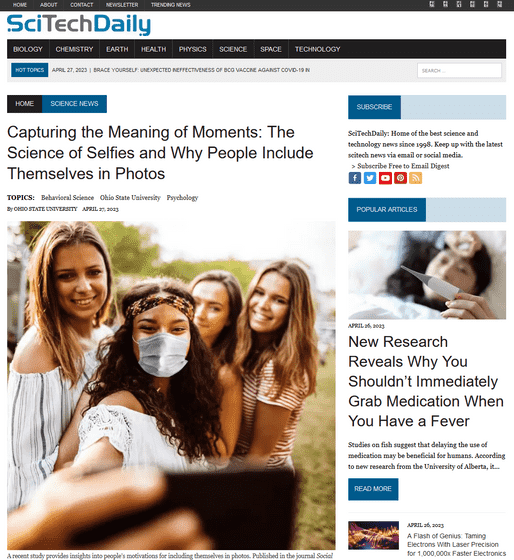Research reveals 'why do people take selfies', what kind of scene is best to take selfies?

In general, people who take selfies tend to think that they are photographing their faces for 'self-assertion'. A popular claim is that people want to look top notch by taking selfies that show their faces, show where they are and what they do. But a study conducted by psychologists at Ohio State University suggests that the psychology of taking selfies may have a deeper meaning.
Capturing the Meaning of Moments: The Science of Selfies and Why People Include Themselves in Photos

Zachary Nise of Ohio State University and others conducted six surveys of 2113 participants to explore people's psychological states regarding selfies. As a result, it became clear that the selfie has the effect of most effectively conveying the psychological state at the time of shooting.
In the first study, participants were asked to read a photo-inviting scenario, such as 'a day at the beach with a close friend,' and rate how important the experience was likely to be for them. I was. As a result, it turns out that participants tend to want to take selfies at events that are likely to be an important experience for them.

In a second survey, participants were shown a photo they had posted on Instagram and asked, 'What does this photo make you think about?' The answer options are 'What kind of experience did you have at the time of shooting' or 'How did you feel at the time of shooting'. When asked to choose an answer from these two, it was found that the answers tended to differ between selfies and other photos.
According to Mr. Niese et al., in the case of self-portraits in which the participants themselves are shown, many of the participants answered 'feelings at the time of shooting', while in the case of photographs showing the situation from their own perspective, , He said that he answered 'experience at the time of shooting'. From this, Niese et al. speculate that selfies can effectively express the ``psychological state at the time of shooting'' more than landscape photos and other photos.

Another study also found that people don't like a photo as much if there is a mismatch between the perspective of the photo and the purpose for which it was taken.
In another survey using Instagram posts, Niese and others asked whether they felt positive or negative about the photo, based on a survey that asked them to answer 'experience during the shoot' or 'feeling during the shoot.' I let the participants answer. As a result, the participants who answered that their goal was to capture their feelings during the shoot rated the selfie positively.
From these studies, Nise et al. conclude that selfies have a deeper purpose, not only for self-assertion, but also for recalling the feelings when taking a picture.
“We hope that this research will increase people's knowledge of photographic perspectives, so that they can consciously choose the perspective that meets their goals,” Niese said. said.
Related Posts:
in Science, Posted by log1p_kr







